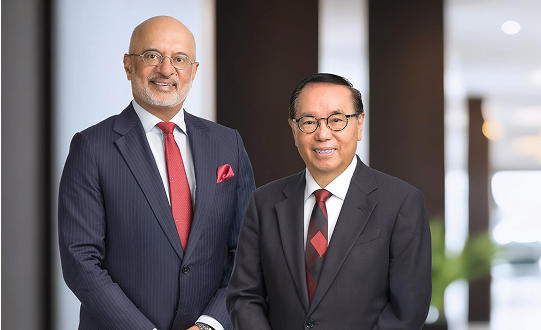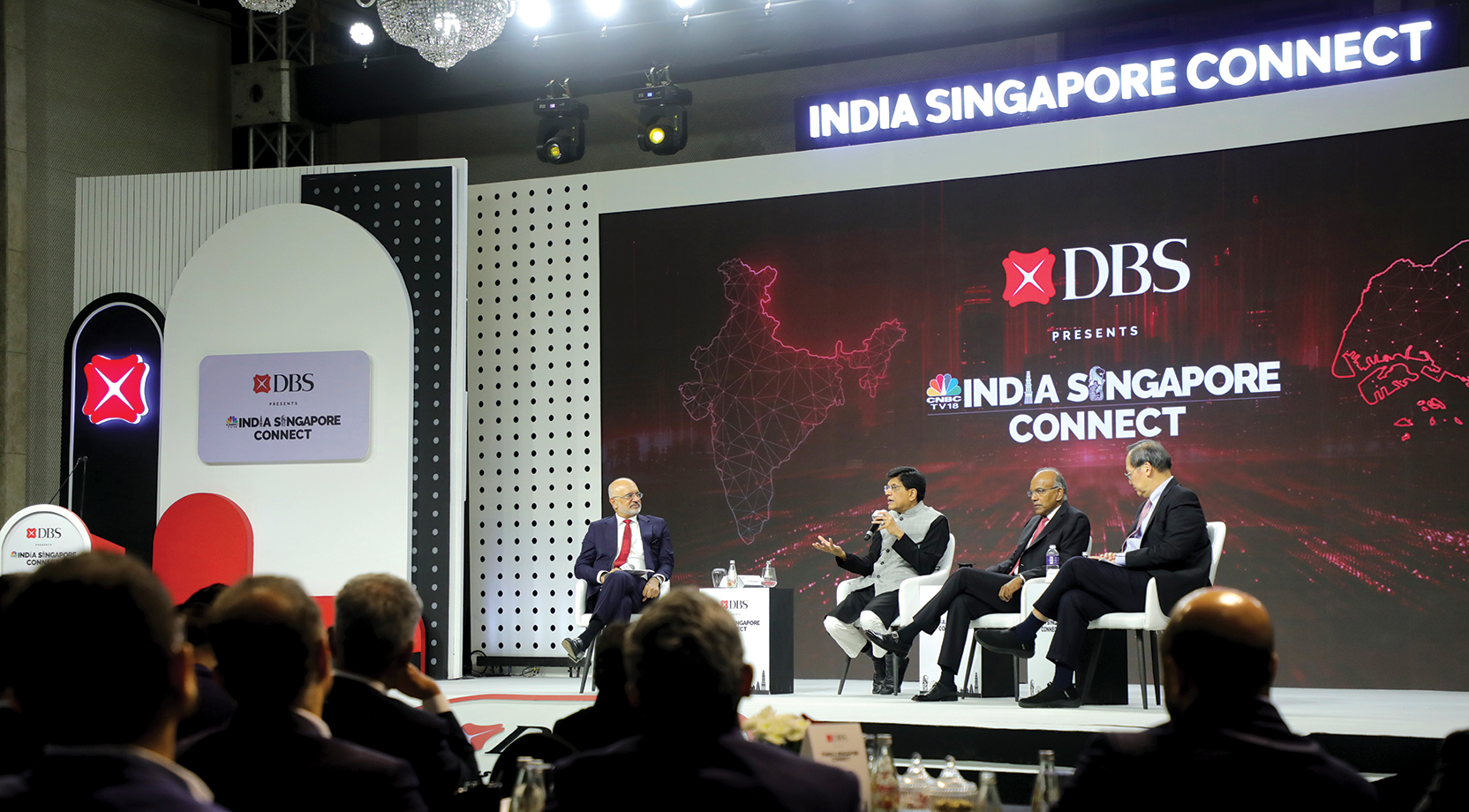Making Greater Impact
Download Annual Report 2024 | 中文DBS Group Holdings Ltd
Annual Report 2024
Letter from
Chairman & CEO
In May 2024, DBS blazed a trail by being the first Singapore-listed company to cross SGD 100 billion in market capitalisation. Since 2009, our market capitalisation has quadrupled even while we paid out SGD 40 billion in dividends.

The global economy was resilient in 2024. The US economy continued to outpace expectations by growing 2.8% from strong consumer demand. Global growth also generally held up. While China and Hong Kong experienced slower growth, Singapore’s economy expanded 4.4%, marking a strong rebound from just 1.8% the year before. India, a market where we now have a sizeable footprint, continued to be the fastest-growing major economy in the world.
Inflationary pressures eased during the year. With the US Consumer Price Index declining from 3.4% at end-2023 to 2.9% at end-2024, the US Fed cut interest rates for the first time in four years in September, by 50 basis points, followed by two more rate cuts of 25 basis points each. Other developed market central banks followed suit. The cuts, telegraphed well ahead of time, unleashed animal spirits and buoyed financial markets in the latter part of the year.
Macroeconomic conditions were, however, tempered by persistent geopolitical tensions and by policy unpredictability from an impending Trump presidency. At the same time, expectations for further rate cuts were moderated towards the end of the year as progress towards the Fed’s inflation target of 2.0% appeared to stall.
Against this backdrop, we delivered a solid financial performance. DBS was also named Safest Bank in Asia by Global Finance for the 16th consecutive year.
Another record year
For the year, DBS delivered record total income of SGD 22.3 billion. Net profit rose 11% to an all-time high of SGD 11.4 billion. Return on equity (ROE) was 18.0%, which was one of the highest among developed market banks.
The solid financial performance belied challenges we faced from muted loan growth. Weak investment sentiment in Hong Kong and China impacted loan demand, while Chinese companies tapped lower-cost funding onshore. Despite these headwinds, we managed to grow net interest income (NII) by 6% through judicious balance sheet management.
In 2021, before interest rates rose, DBS had an NII sensitivity of SGD 18-20 million per basis point of Fed funds rate. This meant that through the interest rate upcycle over the past two years, a 1 basis point hike in the Fed funds rate increased our NII by up to SGD 20 million. To cushion against a reversal of similar quantum should the interest rate cycle turn, we took proactive steps to increase fixed-rate assets and extend asset duration. Coupled with changes to our funding profile, our NII sensitivity fell to SGD 4 million in 2024, helping to mitigate the impact of US Fed rate cuts, allowing NII to rise through balance sheet growth.
Commercial book non-interest income rose 22% to a record SGD 6.33 billion, bolstered by buoyant investor sentiment which propelled wealth management fees and treasury customer sales to new highs. Markets trading income was 27% higher at SGD 922 million.
Asset quality remained resilient, with the non-performing loan ratio stable at 1.1%.
In May 2024, DBS blazed a trail by being the first Singapore-listed company to cross SGD 100 billion in market capitalisation. Total shareholder returns for 2024 were 51%, the highest in DBS’ history outside crisis-rebound years, comprising a share price gain of 44% and a dividend return of 7%.
Record earnings and confidence in our continued performance drove these returns. They also reflected the market’s recognition of DBS’ franchise strength wrought from our 15-year structural transformation.
In 2010, our first year together as Chairman and CEO, we set out to become the “Asian bank of choice”. At the time, DBS was primarily a two-market bank, with a meaningful presence only in Singapore and Hong Kong. Our ROE stood at just 8.4% the previous year. We served five million customers, mostly in Singapore, and had the lowest customer satisfaction scores among the Singapore banks.
We have come a long way since then. The market now sees us as a best-in-class Asian bank, and also among the world’s best, as testified by our multiple World’s Best Bank award wins. Since 2009, our net profit has grown fivefold, and our ROE more than doubled. We re-established market share leadership in Singapore, while high-ROE regional businesses (wealth management, transaction services and treasury customer sales) now contribute 50% of group income. Our customer base has almost quadrupled to 19 million across Asia, with high customer engagement scores across customer segments. We have also digitally transformed the organisation.
Since 2009, our market capitalisation has quadrupled even while we paid out SGD 40 billion in dividends. DBS’ total shareholder returns since the end of 2009 ranked in the top decile of the world’s 100 largest banks.
Building a robust franchise
DBS’ diversified engines of growth – across geographies and businesses – have been a source of strength, enabling us to buffer against a slowdown in any single part of the franchise.
As an example, for the first half of the last decade, we rode on China’s strong growth and grew our business as China opened up. In the last couple of years, with China experiencing a slowdown, we focused our growth efforts on India and Taiwan.
In 2024, income in India grew 25% as we leveraged our full-service platform spanning institutional, wealth and retail banking to more fully participate in India’s growth. In particular, with our increased breadth and scale, we saw robust growth in our India assets led by large-corporate borrowing, including in our GIFT City branch. Our SME business saw improving momentum while consumer banking had good traction.
In Taiwan, DBS is now the largest foreign bank following the successful integration of Citi’s consumer banking business. Despite facing higher-than-expected attrition from among the Citi employees, we continued to deliver strong customer outcomes. Income grew 61%, close to projections, driven by the full-year contribution from the Citi portfolio and customer synergies from the acquisition. In particular, wealth management had a standout year as we successfully engaged the larger combined customer base on a broader suite of products.
Notwithstanding a slowing China, we saw pockets of opportunity. They included the Greater Bay Area (GBA) Wealth Management Connect 2.0 as well as increased demand from mainland Chinese companies wanting to diversify their supply chains into Southeast Asia. We made two strategic investments which will position us well in the long term. We upped our stake in Shenzhen Rural Commercial Bank, which gives us a good footprint in GBA, from 16.69% to 19.4%. We also increased our stake in DBS Securities China from 51% to 91%.
In 2024, we also merged our equity capital markets unit, DBS Vickers and DBS Digital Exchange with the Treasury Markets business, forming Global Financial Markets. The merger has provided greater synergy and allows us to more holistically meet our customers’ needs. Our new business engines also fared well, with income from our digital asset ecosystem now above SGD 30 million amid growing interest by institutional investors in the trading and custody of digital assets.
Leadership Transition
The Board and I would like to extend our heartfelt thanks to Piyush for his exceptional leadership and dedication throughout his tenure as CEO. Under his stewardship, DBS has evolved into one of Singapore’s most iconic institutions and a global financial powerhouse, with an ROE that places us among the top-performing banks globally.
Our strong performance reflects the structural changes Piyush has implemented over the past decade, especially the digital transformation and growth of high-ROE businesses such as wealth management, transaction services and treasury customer sales. He has built an enduring legacy through his visionary leadership, establishing the cornerstone for DBS to reach new heights in the years ahead.
As we honour Piyush’s achievements, we look forward to a new chapter under Su Shan, who will succeed him in March 2025. Planning for the CEO succession has been a decade- long strategic initiative, with potential successors identified and rotated through key roles, and their performance closely assessed.
In 2021, when Piyush informed the Board of his intention to retire after turning 65, the Board expedited the succession process by engaging an independent consultant to benchmark external candidates against internal ones using six key criteria: strategic vision, leadership and culture, domain knowledge, stakeholder management and communication, familiarity with technology and the future of work, as well as business-building ability. After thorough evaluations conducted by the Board and the independent consultant, Su Shan emerged as the standout candidate to succeed Piyush as CEO.
Su Shan possesses extensive experience, having managed the bank’s two customer-facing divisions, Consumer Banking Group/ Wealth Management (CBG/ WM) and Institutional Banking Group (IBG), which together contribute the lion’s share of its income. She played an instrumental role in transforming the Wealth Management business, with DBS Private Bank now one of Asia’s top three, and in scaling Global Transaction Services, which expanded the bank’s low-cost deposit base.
She has also been pivotal in developing major digitalisation initiatives such as DBS digibank, PayLah! and iWealth, leading the IBG team in revitalising the IDEAL app and implementing an API suite for real-time digital banking. Additionally, she drove the development of a number of AI models and spearheaded efforts to apply generative AI within the bank.
She also has broad international exposure, having worked in global financial centres such as London, Tokyo and Hong Kong. She has served on various boards in government, finance, education, women’s leadership and entrepreneurship.
The Board and I are confident in Su Shan’s ability to lead the bank given her track record, disciplined execution and strong business acumen. We take pride that she is a homegrown talent, reflecting our commitment to developing a local talent pipeline. With a profound understanding of Singaporeans’ perspectives, a passion for flying the Singapore flag high, and a resonance with DBS’ core mission, she is poised to drive the bank’s continued success.
Maturing new ways of working
To create a sustainable advantage, DBS continued to industrialise the use of data analytics and artificial intelligence (AI)/ machine learning (ML). In 2024, data analytics and AI/ ML delivered economic value of SGD 750 million, more than double the previous year. We also started piloting several Gen AI use cases to drive productivity and efficiency gains, create value through better customer engagement and new customer propositions, and potentially open new segments and markets.
DBS’ focus on Managing through Journeys, a process we started three years ago, matured further. By organising ourselves horizontally with cross-functional teams formed around customer journeys and guided by real-time data, we continued to improve customer satisfaction and turnaround times, which in turn contributed to higher income. For example, in 2024, we halved the time taken to implement SME payment and collection API mandates in Singapore. We also achieved above-target customer engagement scores across various businesses including Deposits and SME Hong Kong.
Enhancing technology resiliency and governance
Strengthening the bank’s technology resiliency remained a priority for much of 2024, and significant progress was made. We tightened our change management processes, simplified our systems architecture and reduced single points of failure. We also enhanced our ability to more quickly identify incidents and resolve them. While a small number of long-tail initiatives remain in progress, we believe most of our technology resiliency gaps have been closed.
In view of this, the Board Risk Management Committee Technology Risk Committee (BTRC) – which was established to strengthen technology risk governance and oversight – was dissolved in January 2025. In its place, the Board Technology Committee (BTC) was set up with a wider mandate. The BTC took over the responsibilities of the BTRC while also having oversight of the Group’s technology strategy and architecture. This is important as technology becomes all-pervasive, and as the bank continues to balance innovation (such as in the areas of AI and blockchain) and resiliency.
Advancing the sustainability agenda
Earlier this year, a number of large banks withdrew from the Net Zero Banking Alliance, the banking sector’s largest climate-focused alliance. Notwithstanding this, DBS remains committed to enabling a just transition within the context of Asia that balances environmental, social and economic considerations. Climate change is a real issue that needs addressing; we believe that in finding solutions to tackle the “wicked” problems facing our environment, there are business opportunities too.
DBS was the first bank in Southeast Asia to set decarbonisation targets. As we partnered more businesses in their transition to lower- carbon business models, our sustainable financing commitments, net of repayments, rose 27% to SGD 89 billion in 2024. Beyond financing, we also empowered our RMs with tools and dashboards so they can better advise clients on their decarbonisation plans.
Since it was established a decade ago, DBS Foundation has supported 161 Businesses for Impact and forged 37 community programmes across the region. To further intensify our social impact, we have committed up to SGD 1 billion and 1.5 million volunteer hours over the next 10 years to improve the lives and livelihoods of the low-income and underprivileged. In 2024, we committed more than SGD 100 million to support various multi-year programmes to meet essential needs and foster inclusion across Asia.

To commemorate DBS’ 30 years in India, the bank held an India-Singapore summit to foster a deeper exchange of ideas and collaboration between the two countries. In attendance as Guests of Honour were India’s Minister of Commerce and Industry Piyush Goyal, Singapore’s Minister of Home Affairs and Minister of Law K. Shanmugam and Singapore’s Minister for Manpower and Second Minister for Trade and Industry Tan See Leng.
Leadership changes
Apart from the forthcoming CEO leadership change, we made several other key management changes.
In May 2024, we named technology veteran Eugene Huang as CIO. Eugene joined DBS from Ping An Group, where he led the technology unit.
Effective 1 January 2025, we appointed Han Kwee Juan and Lim Him Chuan to new roles. Kwee Juan, previously Singapore Country Head, took over as Group Head of Institutional Banking, stepping into the role Su Shan relinquished. Him Chuan, formerly Group Head of Strategy, Transformation, Analytics & Research, was named Singapore Country Head.
In India, Rajat Verma, Head of IBG, succeeded Surojit Shome as CEO when the latter retired on 28 February 2025. Since joining DBS in June 2023, Rajat has solidified our India IBG business.
Derrick Goh, presently Group Audit Head, will assume the role of Group Chief Operating Officer overseeing both Operations and Transformation Group from 1 April 2025. Koh Kar Siong, presently Group Head of Corporate and SME Banking, will take over as Group Audit Head.
The moves reflect the strength of DBS’ talent management programme and the robust bench we have built over the years.
We are committed to capital management. We substantially increased the amount of ordinary dividends and paid occasional special dividends in recent years.
In 2024, we added to our capital management toolkit. In February, we announced a one-for-10 bonus issue, which effectively raised dividend payouts by 10%. In November, we launched a SGD 3 billion share buyback programme, marking the first time that shares will be repurchased and cancelled. From financial year 2025, a Capital Return dividend will be introduced.
Given the record profit and strong capital base, the Board proposed a final dividend of 60 cents per share, bringing the full-year ordinary dividend to SGD 2.22 per share, an increase of 27% over the previous year.
A special bonus of SGD 1,000 each, indexed to purchasing power parity in markets outside Singapore, was also paid to all staff except senior managers as an additional reward for their contribution to the record performance.
Conclusion
Overall, the business environment for 2025 appears to be stable. However, macroeconomic and geopolitical risks remain. A slowing China, military conflicts and a potential escalation of tariff wars under a Trump administration all add to the uncertainty.
For DBS, declining interest rates will also be a source of potential headwinds. Nevertheless, our franchise is resilient. Our NII sensitivity is substantially lower than previous years. Our balance sheet is solid, and we have maintained strong general provisions and capital buffers which will help cushion risks. Barring any unexpected global shocks, we expect pre-tax profit to be around 2024 levels.
Having been at the forefront of digital transformation, we will continue investing in technology. Our early moves in data have created a competitive differentiation. Importantly, our people have embraced AI and Gen AI which will fundamentally change the way we work. We will also continue to advance the sustainability agenda, partnering clients in their transition to lower-carbon business models, as we execute on our net-zero commitments.
DBS has created significant value for all our stakeholders – shareholders, customers, employees and society – over the years. In 2024, we made an even greater impact – the culmination of a multi-year effort to stay at the forefront of banking, be customer-focused and embody “doing well by doing good”.

